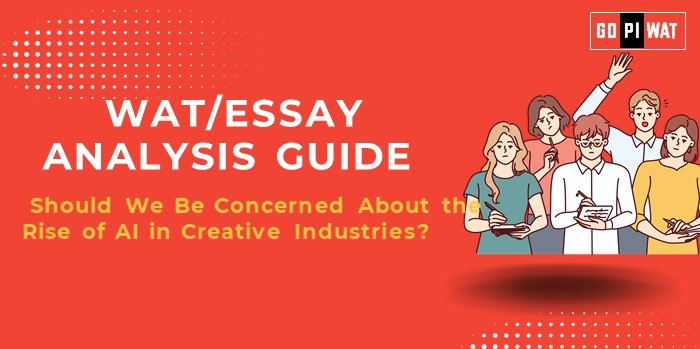📋 Group Discussion (GD) Analysis Guide
🎨 Topic: Should We Be Concerned About the Rise of AI in Creative Industries?
🌐 Introduction to the Topic
Context Setting: “Artificial Intelligence (AI) is redefining creativity, from generating art to composing music, raising profound questions about its implications on originality and employment in creative industries.”
Topic Background: The integration of AI into creative industries is driven by its ability to produce art, music, literature, and designs with unprecedented speed and scale. However, concerns about authenticity, artistic value, and job displacement persist, necessitating deeper analysis of its long-term impacts.
📊 Quick Facts & Key Statistics
- 💰 AI Art Market Growth: Valued at $3.2 billion in 2023, expected to reach $40.4 billion by 2033, with a CAGR of 28.9%.
- 📉 Job Displacement: 40% of business leaders attribute layoffs to AI technologies replacing human roles.
- ⚡ Content Generation Speed: AI tools enhance productivity, creating extensive volumes of text, imagery, and sound on demand.
- 🤔 Consumer Concerns: Debates on authenticity and originality persist, with fears AI could undermine the human touch in creative expressions.
🤝 Stakeholders and Their Roles
- 🎨 Artists and Creatives: Innovators and advocates for authentic, human-led artistry, yet impacted by job automation.
- 💻 Technology Firms: Leading AI innovation, providing tools that democratize creativity but often drawing criticism for ethical lapses.
- 🏛️ Governments and Policy Makers: Tasked with regulating AI to balance innovation with ethical considerations.
- 👥 Consumers and Audiences: Beneficiaries of accessible, high-quality content but also critical of perceived loss of authenticity.
🏆 Achievements and Challenges
- Achievements:
- ✅ Democratization of Art: AI platforms enable individuals with no technical skills to create sophisticated content.
- 📈 Productivity Gains: AI allows industries to meet high-volume demands efficiently.
- 💡 Market Growth: The AI art sector’s rapid expansion reflects its growing economic importance.
- Challenges:
- 📉 Job Reductions: Automation-driven layoffs are reshaping the workforce.
- ⚖️ Ethical Dilemmas: Concerns about copyright infringement and loss of originality.
- 🎭 Cultural Impact: Fears AI art lacks emotional depth and human touch.
🌍 Global Comparisons
- 🇯🇵 Japan: Leveraged AI in manga production, preserving cultural significance while boosting efficiency.
- 🇺🇸 US: Legal debates over the ownership and copyright of AI-generated works.
Case Study: The Hollywood strikes of 2023 highlighted concerns over AI usage in scriptwriting and actor likeness reproduction, signaling labor rights and creative integrity issues.
🧠 Effective Discussion Approaches
- Opening Approaches:
- 📊 Fact-Based: “With AI in art projected to grow to $40.4 billion by 2033, should we celebrate or scrutinize its rise?”
- ⚖️ Ethical Angle: “Can we call it art if it’s generated by algorithms rather than human emotion?”
- 🎭 Case Study Start: “The Hollywood strikes in 2023 showed how creative industries are grappling with AI’s impact. What lessons can be drawn?”
- Counter-Argument Handling:
- Present real-world examples, such as AI aiding human creativity rather than replacing it.
- Highlight collaborative opportunities where AI complements human ingenuity.
🔍 Strategic Analysis of Strengths and Weaknesses
- Strengths: Democratizes art by reducing barriers to entry, scalability, and rapid content creation.
- Weaknesses: Raises copyright and intellectual property concerns, perceived lack of originality and depth.
- Opportunities: Collaboration between AI and human creators, niche markets for bespoke, handcrafted art.
- Threats: Increased job automation, over-reliance on machine-driven creativity.
📄 Structured Arguments for Discussion
- ✅ Supporting Stance: “AI empowers creators to scale their output and explore new artistic possibilities.”
- ❌ Opposing Stance: “AI undermines human creativity and threatens livelihoods in the arts.”
- ⚖️ Balanced Perspective: “AI can complement creativity, but ethical and regulatory safeguards are essential to maintain artistic integrity.”
📚 Connecting with B-School Applications
- 💼 Real-World Applications: AI-driven marketing campaigns and content strategies.
- 📝 Sample Questions:
- “How can industries safeguard originality while leveraging AI in creative roles?”
- “What are the long-term implications of AI on cultural industries?”
- 💡 Insights for Students: Highlights the intersection of technology, ethics, and business strategy. Offers insights into managing change and fostering innovation in AI-impacted industries.


